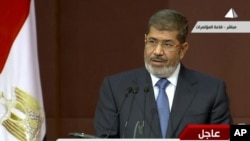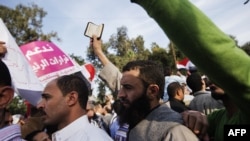CAIRO —
Egyptian President Mohamed Morsi has set a date of December 15 for a national referendum on a controversial new constitution that has sparked large protests. The president announced the date after Egypt's Islamist-dominated assembly handed its final draft of the constitution to him late Saturday. The draft retains the principles of Islamic law as the main source of legislation.
Earlier Saturday, tens of thousands of Islamists demonstrated across Egypt in support of Morsi and the draft constitution. Supporters gathered outside Cairo University and elsewhere, waving Egyptian flags, raising banners and demanding the implementation of what they called "God's law."
Activists from both the Muslim Brotherhood group and the more hardline Salafist Nour Party led the crowd in chants of "the people want to apply God's law." Islamist supporters of Morsi insist the new constitution must be based on Islamic sharia law.
The rump committee that drafted Egypt's proposed new constitution Friday is expected to present the document to Morsi in a matter of hours. Secular and liberal members have withdrawn from the committee, complaining that Islamists are over-represented in the group, and dominating its work.
Sheikh Younes Makhloun, a Salafist member of the constitutional committee, defended its work before the crowd at Cairo University.
Makhloun said what he calls "God's law," or Islamic sharia law, should be the basis of Egypt's legal system, since Egypt is a Muslim nation and must follow the precepts of Islam.
At the same time, a smaller crowd of Morsi's opponents protested in Cairo's Tahrir Square, at times chanting slogans against him and the proposed constitution. Members of 35 secular, liberal and leftist groups that support the protest are continuing a sit-in there, but there was no call for a mass demonstration in the square on Saturday.
Tareq, a young demonstrator, said many people from the opposition stayed away from Saturday's protests to avoid pro-Morsi crowds.
A large crowd of opposition protesters turned out for the groups' million-man march on Tuesday, Tareq said, but concerns about possible clashes with Islamist militants kept many people at home Saturday.
Fighting between supporters and foes of the president and the new constitution broke out early Saturday in Alexandria. Rocks were thrown at an anti-Morsi crowd that had gathered in front of the Qaid Ibrahim mosque in Egypt's second largest city.
A number of Arab analysts say the worries about increased violence are valid. They see the political situation in Egypt as deadlocked, with Egyptian society divided down the middle between support or opposition to President Morsi.
Earlier Saturday, tens of thousands of Islamists demonstrated across Egypt in support of Morsi and the draft constitution. Supporters gathered outside Cairo University and elsewhere, waving Egyptian flags, raising banners and demanding the implementation of what they called "God's law."
Activists from both the Muslim Brotherhood group and the more hardline Salafist Nour Party led the crowd in chants of "the people want to apply God's law." Islamist supporters of Morsi insist the new constitution must be based on Islamic sharia law.
The rump committee that drafted Egypt's proposed new constitution Friday is expected to present the document to Morsi in a matter of hours. Secular and liberal members have withdrawn from the committee, complaining that Islamists are over-represented in the group, and dominating its work.
Sheikh Younes Makhloun, a Salafist member of the constitutional committee, defended its work before the crowd at Cairo University.
Makhloun said what he calls "God's law," or Islamic sharia law, should be the basis of Egypt's legal system, since Egypt is a Muslim nation and must follow the precepts of Islam.
At the same time, a smaller crowd of Morsi's opponents protested in Cairo's Tahrir Square, at times chanting slogans against him and the proposed constitution. Members of 35 secular, liberal and leftist groups that support the protest are continuing a sit-in there, but there was no call for a mass demonstration in the square on Saturday.
Tareq, a young demonstrator, said many people from the opposition stayed away from Saturday's protests to avoid pro-Morsi crowds.
A large crowd of opposition protesters turned out for the groups' million-man march on Tuesday, Tareq said, but concerns about possible clashes with Islamist militants kept many people at home Saturday.
Fighting between supporters and foes of the president and the new constitution broke out early Saturday in Alexandria. Rocks were thrown at an anti-Morsi crowd that had gathered in front of the Qaid Ibrahim mosque in Egypt's second largest city.
A number of Arab analysts say the worries about increased violence are valid. They see the political situation in Egypt as deadlocked, with Egyptian society divided down the middle between support or opposition to President Morsi.





